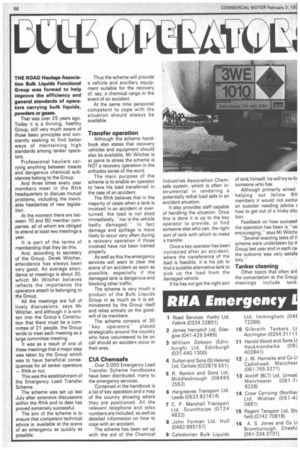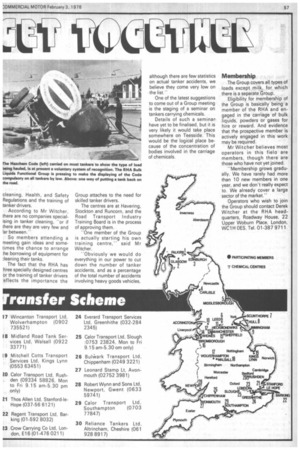THE ROAD Haulage Association Bulk Liquids Functional Group was formed
Page 58

Page 59

If you've noticed an error in this article please click here to report it so we can fix it.
to help improve the efficiency and general standards of operators carrying bulk liquids, powders or gases.
That was over 25 years ago. Today it is a thriving, healthy Group, still very much aware of those basic principles and constantly seeking to find better ways of maintaining high standards among tanker operators.
Professional hauliers carrying anything between treacle and dangerous chemical substances belong to the Group.
And three times every year members meet in the RHA headquarters to discuss mutual problems, including the inevitable headaches of new legislation.
Al the moment there are between 70 and 80 member com.panies, all of whom are obliged to attend at least two meetings a year.
It is part of the terms of membership that they do this.
And, according to secretary of the Group, Derek Witcher, attendance has always been very good. An average attendance at meetings is about 30, which Mr Witcher believes reflects the importance the operators attach to belonging to the Group.
All the meetings are full of lively discussions, says Mr Witcher, and although it is writ ten into the Group's Constitution that there must be a committee of 21 people, the Group tends to treat each meeting as a large committee meeting.
It was as a result of one of these meetings that a major step was taken by the Group which was to have beneficial consequences for all tanker operators — RHA or not.
This was the establishment of the Emergency Load Transfer Scheme.
The scheme was set up last July after extensive discussions within the RHA and to date has proved extremely successful.
The aim of the scheme is to ensure that competent technical advice is available at the scene of an emergency as quickly as possible. Thus the scheme will provide a vehicle and ancillary equipment suitable for the recovery of, say, a chemical cargo in the event of an accident.
At the same time personnel competent to cope with the situation should always be available.
Transfer operation
Although the scheme handbook also states that recovery vehicles and equipment should also be available, Mr Witcher is at pains to stress the scheme is NOT a recovery operation in the. orthodox sense of the word.
The main purpose of the scheme is to enable an operator to have his load transferred in the case of an accident.
The RHA believes that in the majority of cases when a tank is involved in an accident or overturned, the load is not shed immediately, "nor is the vehicle badly damaged." In fact damage and spillage is more likely to occur very often during a recovery operation if those involved have not been trained properly.
As well as this the emergency services will want to clear the scene of an accident as soon as possible, especially if the damaged tank is dangerous and blocking other traffic.
The scheme is very much a product of the Bulk Liquids Group in as much as it is administered by the Group itself and relies entirely on the goodwill of its members.
The scheme consists of 30 "key operators" placed strategically around the country who have volunteered to be on call should an accident occur in their area.
CIA Chemsafe
Over 3,000 Emergency Load Transfer Scheme handbooks have been distributed, many to the emergency services.
Contained in the handbook is a list of key operators and a map of the country showing where they are positioned. All the relevant telephone and telex numbers are included, as well as detailed information on how to cope with an accident.
The scheme has been set up with the aid of the Chemical Industries Association Chemsafe system, which is often instrumental in rendering a potentially lethal load safe in an accident situation.
It also provides staff capable of handling the situation. Once this is done it is up to the key operator to provide, or find someone else who can, the right sort of tank with which to make a transfer.
Once a key operator has been contacted after an accident, where the transference of the load is feasible, it is his job to find a suitable alternative tank to pick up the load from the damaged vehicle.
If he has not got the right sort of tank himself, he will try to fir someone who has.
Although primarily aimed helping out fellow RH members it would not exclu( an outsider needing advice how to get out of a tricky situ tion.
Feedback on how successf the operation has been is "ye encouraging," says Mr WitchE "Several exacting tests of tl scheme were undertaken by tI Group last year and in each ca: the outcome was very satisfa tory."
Tanker cleaning
Other topics that often ent the conversation at the Group meetings include tank cleaning, Health, and Safety Regulations and the training of tanker drivers.
According to Mr Witcher, there are no companies specialising in tanker cleaning, -or if there are they are very few and far between."
So members attending a meeting gain ideas and sometimes the chance to arrange :he borrowing of equipment for 1:leaning their tanks.
The fact that the RHA has hree specially designed centres or the training of tanker drivers .eflects the importance the
Group attaches to the need for skilled tanker drivers.
The centres are at Havering, Stockton and Runcorn, and the Road Transport Industry Training Board is in the process of approving them.
-One member of the Group is actually starting his own training centre,'" said Mr Witcher.
-Obviously we would do everything in our power to cut down the number of tanker accidents, and as a percentage of the total number of accidents involving heavy goods vehicles,
although there are few statistics on actual tanker accidents, we believe they come very low on the list."
One of the latest suggestions to come out of a Group meeting is the staging of a seminar on tankers carrying chemicals.
Details of such a seminar, have yet to be finalised, but it is very likely it would take place somewhere on Teesside. This would be the logical place because of the concentration of bodies involved in the carriage of chemicals. Membership
The Group covers all types of loads except milk, for which there is a separate Group.
Eligibility for membership of the Group is basically being a member of the RHA and engaged in the carriage of bulk liquids, powders or gases for hire or reward. And evidence that the prospective member is actively engaged in this work may be required.
Mr Witcher believes most operators in this fiela are members, though there are those who have not yet joined.
"Membership grows gradually. We have rarely had more than 10 new members in one year, and we don't really expect to. We already cover a large sector of the market."
Operators who wish to join the Group should contact Derek Witcher at the RHA headquarters, Roadway House, 22 Upper Woburn Place, London, WC1H OES. Tel. 01-387 9711
























































































































































